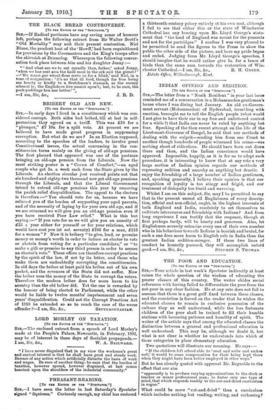INDIAN OPINION AND SEDITION.
[To THE EDITOR OF THE "SPECTATOR."] SIR,—The letter from a " Nasik Resident" in your last issue reminded me of a conversation in a Mohammedan gentleman's house where I was dining last January. An old ex-Govern- ment servant (Mohammedan) of Hyderabad, trembling with emotion, besought me to tell the English people (what would I not give to have their ear in my free and unfettered control for a while ?) that India can never be ruled by anything but fear. Speaking of the then recent attempt on the life of the Lieutenant-Governor of Bengal, he said that our methods of dealing with the culprit—sending him from one Court to another though hundreds of people witnessed his crime—was nothing short of ridiculous. He should have been cut down there and then, and the Indian conscience would have approved. Impossible, happily, as it is for us to adopt such procedure, it is interesting to know that at any rate a very large section of Indian opinion regards our methods of repressing sedition and anarchy as anything but drastic. I enjoy the friendship of a large number of Indian gentlemen, and, speaking generally, I believe their opinion is that our recognition of loyalty is too stingy and frigid, and our treatment of disloyalty too timid and wavering.
Whilst I am on this subject, Sir, may I be permitted to say that in the present unrest all Englishmen of every descrip- tion, official and non-official, ought, in the highest interests of both England and India, resolutely to set themselves to cultivate intercourse and friendship with Indians ? And from long experience I can testify that the response, though at first perhaps tardy, will be hearty and generous. Also, let Englishmen severely ostracise every one of their own number who in his behaviour towards Indians is boorish and brutal, for such a one does more harm to English rule in India than the greatest Indian sedition-monger. If these two lines of conduct be honestly pursued, they will accomplish untold






















































 Previous page
Previous page